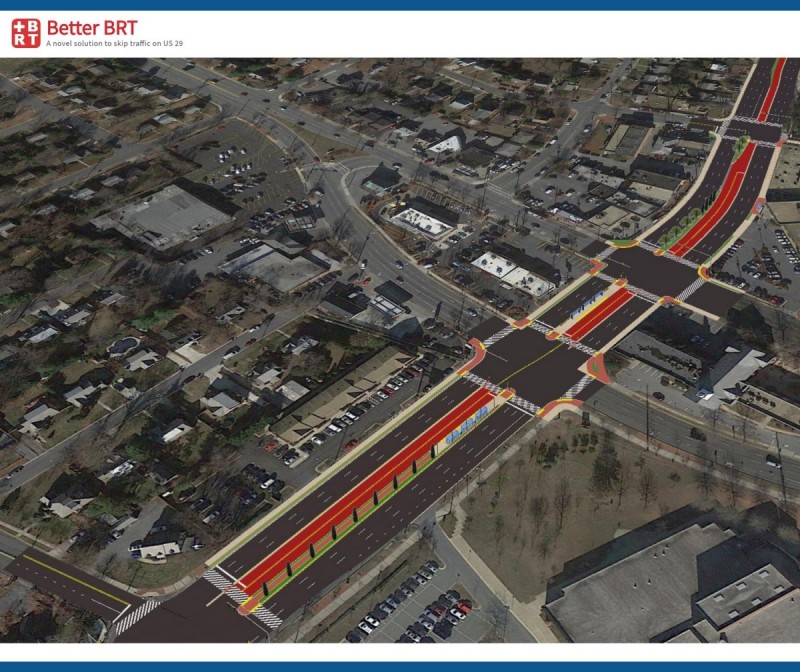If you're going to make bus service so fast and reliable that people will leave their cars at home, you can't let buses get stuck in car traffic. That's why bus lanes are such an important component of the 82-mile bus rapid transit network Montgomery County, Maryland, is putting together.
But on one of the key corridors in the network -- Route 29 -- the BRT plan calls for bus lanes on just 40 percent of the route. So local activists came up with a better idea, reports Pete Tomao at Greater Greater Washington:
East County residents Sean Emerson and Sebastian Smoot came up with a proposal to bring dedicated lanes into the southern, more traffic-clogged portion of Route 29. The “Better BRT” plan builds upon the county’s current plan as a follow-up “Phase 2” project.
The key feature of “Better BRT” is to “squeeze in” bidirectional or reversible bus-only lanes from Tech Road to Sligo Creek Parkway by narrowing existing travel lanes by one foot and repurposing part of the median. Using this approach, the plan would require minimal road widening, retain six car lanes (three each way), and still provide left turn pockets into each neighborhood. Under the “Better BRT” plan, 90 percent of Route 29 would have some form of dedicated busways. Additionally, the plan could lead to long-requested safety features such as crosswalks and traffic signals that the State Highway Administration has been unwilling to implement.
Bus riders get faster service without the political fight that always ensues when car lanes are converted to transit lanes. Except some people are fighting the "Better BRT" plan anyway, writes Tomao:
This past December, the Montgomery County Council asked MCDOT to move forward with funding the Emerson study, citing the large benefits that more dedicated lanes would bring to the Route 29 Corridor. MCDOT found $425,000 in unused funds that could be reallocated to move forward with the study, and the council was set to approve the funding at their January 30 council session. This is where things got interesting.
Anti-BRT activist Kevin Harris accused the council of behaving in a shady manner and demanded additional public hearings before any study could move forward (he was testifying at a public hearing that was televised). Harris opened by stating, “I'm here at the last minute because what we’ve seen here is a last minute move to insert funding for a study to study putting the BRT in the median of Route 29…this is a CIP [Capital Improvements Program] for a cost savings plan. Not a pork plan!”
Harris accused the council of thwarting democracy, saying, "When you open up the Washington Post what it says is 'Democracy Dies in Darkness.' This is darkness!”
As insane as that sounds, Harris has already slowed down the attempt to give transit more priority on Route 29. After that presentation, Montgomery County Council postponed its vote to study the "Better BRT" plan until after an additional hearing.
More recommended reading today: Seattle Transit Blog reports that the city is exploring a zoning change that would eliminate residential parking requirements near transit. And the Natural Resources Defense Council slams the Trump administration for threatening to zero out funding for the TIGER program.






